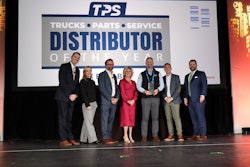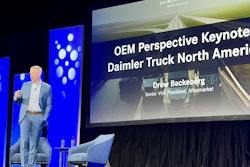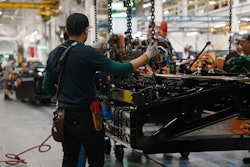Counterfeit heavy-duty parts in the aftermarket have attracted a good deal of attention. The issue has been discussed at some of the industry’s more prominent venues this year, including Heavy Duty Aftermarket Week (HDAW) and the spring meeting of the Technology & Maintenance Council (TMC), as well as other industry gatherings. The Motor Equipment Manufacturers Association (MEMA) considers it a priority issue.
The issue is at times polarizing. Some feel it is blown out of proportion and unfairly condemns parts brought to market by manufacturers and suppliers of quality tested, legally distributed replacement products. Others say it is a significant and growing aftermarket issue.
Distributors and installers can be at risk, even unwittingly, if the parts they sell or replace fail. While counterfeit parts introduce greater risks, simply being the importer of a product can create problems. Liability can exist throughout the entire supply chain, from the manufacturer through to the distributor, which is why it is always vital to know the products you distribute are supported by manufacturers with a reputation for quality who are willing to stand behind their products.
To take a lesson from the automotive side of the business, a New Jersey-based company recently was ordered by the National Highway Traffic Safety Administration (NHTSA) to recall as many as 450,000 imported light-truck tires after two highway fatalities were linked to the product. The company that imported the tires claimed it could not afford to recall and replace the tires.
NHTSA’s response was if you import a vehicle or a component, you are considered the manufacturer and are responsible for product standards. The importer is also facing lawsuits from the families of the two men who died in the accident involving the allegedly defective tires.
Counterfeiting, across all industries, is a $250 billion a year problem that costs 750,000 jobs, according to the U.S. Chamber of Commerce’s Coalition Against Counterfeiting and Piracy (CACP). But for all legitimate manufacturers and suppliers, it can erode more than just profits – it weakens supply chains, damages consumer confidence and undermines brand integrity.
WHAT IS COUNTERFEIT?
Any discussion of counterfeit products must begin with a definition of what a counterfeit product is. Here, too, opinions differ. Confusion and resentment reign when the term “counterfeit” is not applied accurately. When asked to define a counterfeit part, some wrongly point to knockoff parts or even to fair and competitive replacement parts.
If the lines between legitimate and illegitimate parts aren’t well drawn, the issue becomes litigious and divisive while the real threats of counterfeiting go unchecked. And, to take lessons from other industries – including those closely related to the heavy-duty aftermarket, such as the automotive aftermarket – the real emphasis must be placed on the general safety of the consumer and those who share the roadways.
“A counterfeit is an illegitimate product that bears the trademark or trade dress of a legitimate product,” says Sarah Bruno, intellectual property counsel and associate with Arent Fox, a firm that works with MEMA.
In short, counterfeit parts are parts that say they are something that they are not. They are products brought to market with the intent to deceive the consumer. Not products marketed with “as good” or “even better” promises, but products sold as the genuine part. They are components that are deceitfully marketed to trick consumers – both distributors and end users – that what’s in the box is something that it is not.
A counterfeit part is different than what is considered, legally, a knockoff part. And a knockoff part is not what is defined as a will-fit or replacement part – an aftermarket alternative in both the automotive and heavy-duty markets to provide consumers with an additional choice.
“Terms can vary between industries, but in the automotive industry a knockoff typically has some of the trade dress, but the product name might be slightly different,” says Bruno. “It’s an infringement, but it’s not as blatant as a counterfeit. A generic part or a non-branded product if labeled properly, however, is not an infringement.”
Knockoffs often are legally evaluated on a case-by-case basis and the ruling largely depends on how much work a company has done to protect its brand identity. Courts will look upon firms who have proactively guarded their brands more favorably.
“The legal definition [of a counterfeit part] is clear,” says Robert Lindley, general manager, Parts Distributing Company. “It applies to reproductions of packaging when the intent is to defraud or violate intellectual property laws, such as trademarks, copyrights or patents.
“Counterfeit should not be lumped in with replacement or import,” Lindley continues. “If the term is being used to scare consumers to stop buying replacement products, then it must be stopped. High-quality replacement parts that allow a savings and do not violate intellectual property laws are healthy. This competition preserves consumer choice, stops monopolies on parts and reduces price gouging.”
Lindley emphasizes that replacement parts are not counterfeit parts. There is no deceit or illegality in how they are brought to market, and customer loyalty can be as strong with these replacement components as any other choice.
THE MANUFACTURERS’ COST
Incidents of counterfeiting have been well documented by OEMs. MEMA estimates the counterfeit and knockoff parts business to be a $12 billion industry between the automotive and commercial vehicle markets.
Many manufacturers have their own horror stories in which a product bearing their name or trade dress has emerged and been found completely lacking in quality, performance and safety. Bendix Commercial Vehicle Systems has unearthed counterfeit air dryers filled with kitty litter instead of desiccant.
“We have a product that we’ve never produced in China, but we still see counterfeit product coming from there,” says Andy Cifranic, brand manager, Bendix.
For instance, Bendix has documented a counterfeiting incident reported by Roger Nunnery of Rhett Butler Trucking in Sanford, N.C.
One of Butler’s drivers was having trouble with a dash valve. The driver went to a local repair shop and asked specifically for a Bendix dash valve. The product given looked like a Bendix dash valve and was sold in a Bendix box for the same price.
Three days after installation, the truck was on a scale and the driver pulled the valve to set the brakes. The valve broke off at the shaft. Since air pressure was built-up, the plunger shot off and ricocheted through the cab. The driver was not injured by the projectile. However, the now immobile truck caused a lengthy backup on the scales. For Butler’s company, the result was a lost product load, a service call, two hours of labor and downtime and five hours of driving time to retrieve the driver, according to Bendix.
When an inspection was conducted, the valve was found to be a fake. Nunnery was surprised; the part had looked just like the requested Bendix part.
“Foremost, public safety is at stake,” says Cifranic, who has been a dedicated counterfeiting combatant. “Every product we make is critical to a system. A counterfeit puts everyone on the road at risk. That’s our main concern.”
Unfortunately, the most commonly counterfeited parts are safety related: brake shoes, braking components and lighting.
Counterfeiters put appearance before function. They are adept at copying a product’s exterior, but don’t have an engineer’s critical understanding of why certain materials are used or why a hole must be in a certain position or a bolt placed just so. This ignorance can be disastrous when a truck hits the road.
While safety is their primary concern, original parts manufacturers also risk losing equity in their brands.
“The declining value of well-known brands, the transgression of intellectual property – this is also on the line,” Cifranic continues. “When fleets lose faith in a brand, it becomes valueless.”
Manufacturers devote significant resources to the fight against counterfeiting. In an increasingly global market, a brand is often the most valuable possession a company has and manufacturers are becoming ever more aggressive about protecting their product. They simply cannot afford to be passive.
Had the counterfeit dash valve in the Rhett Butler Trucking incident not been discovered and brought to Bendix’s attention, Nunnery likely would have assumed that it was a poor quality Bendix replacement part. Bendix would have lost critical brand value.
Reputable manufacturers often spend immense sums of money to put their parts through rigorous quality testing to ensure that they are durable and safe. They also back their products with warranties and customer support; they put human faces behind the products they sell. All this has a high price tag, which is often reflected in a higher purchase price to the end user.
“Manufacturers must promote their brand,” says Bruno. “It’s key to a successful trademark [infringement] suit. Prove you have spent a lot of money and time developing your brand. If a company has spent a lot of money and time and gathered evidence, the trademark suit stands a stronger chance of being successful.”
For manufacturers, this is time and money well spent, considering the negative consequences that one accident can wreak on brand value and possible litigation.
The heavy-duty aftermarket is built on relationships – networks through which bad news travels fast. For legitimate manufacturers, the time and money devoted to dealing with warranty and legal issues over counterfeit parts are time and money diverted from product advances and cutting-edge engineering.
According to Joe Mejaly, vice president and general manager, Commercial Vehicle Aftermarket, ArvinMeritor, the overall issue of fighting counterfeits “helps the relationships among us all. It [requires] more awareness, more dialogue, but it just might prevent someone from supplying an inferior counterfeit part.”
DISTRIBUTORS’ THREATS
Counterfeiting has been a long-fought battle in the automotive aftermarket, but until recent years, the issue hasn’t gathered as much attention in the heavy-duty aftermarket.
Increased global sourcing by almost every manufacturer has pushed the issue into the spotlight and the surfeit of design information available on the Internet has contributed to the speed in which parts are criminally cloned.
“Consumer safety and jobs are a main concern,” says Alex Burgos, senior manager, communications, Global Intellectual Property Center, U.S. Chamber of Commerce. “Counterfeiting or piracy shakes consumer confidence in the brands we trust. Counterfeiting threatens a company’s reputation and consumer safety. And the jobs it affects aren’t just about the final company, like Ford or GM. The jobs threatened are through the entire supply chain.”
As high fuel prices and regulatory compliance cut into customer operating costs, parts distributors must stress the importance of spec’ing quality, reputable replacement parts, including communicating the true impact on the bottom line.
“The need for increased and detailed communication is critical,” says Vince Mathews, president and owner of Capitol Clutch & Brake, Inc., headquartered in West Sacramento, Calif. “When customers tell me they can buy a competitive product for substantially less than our price, a discussion takes place to ascertain that the customer knows what he is buying. Some care more than others about the details.”
Reputable distributors and repair shops like Capitol Clutch & Brake act as conduits for communication between manufacturers and customers. “We try to keep our customers informed of the importance of quality products, ones that are tested and supported,” says Mathews. “I think our staff is quite competent in distinguishing a genuine product from a counterfeit one. We have had years of experience and we know what genuine logos, trademarks and part numbers look like.”
Some distributors believe their staff can readily spot counterfeits while others believe these parts can slip by unnoticed. The onus is not all on the distributor to learn logos, part numbers and trademarks. “Manufacturers need to be aware of differences between products,” says Bruno. “They must highlight the differences for distributors so they don’t miss specific signs.”
Distributors face major liability threats when it comes to counterfeit parts (see Sidebar: Legal Trouble on page 23). The cost of hiring a legal defense team in the event of a lawsuit can be staggering. For this reason, and in order to protect their own brand integrity, distributors are becoming more proactive about seeking stronger relationships with trusted manufacturers and aftermarket part providers.
“At stake is our entire market base being sold on inferior products and the continued driving down of prices,” says Presley Pickell, operations manager, Franklin Truck Parts, Inc., Pacoima, Calif.
“We purchase products from the original manufacturer,” says Pickell. “If we see products being sold in the local market at unreasonably low prices, we report these instances to the manufacturer. Many times this has resulted in discovery of counterfeit products.”
Although the issue can be confusing for many distributors, the line is easily drawn; they work only with trusted manufacturers. These distributors stress the importance of looking at price in a broader sense.
For instance, the customers’ cost of a new air dryer isn’t just the ticket price on the shelf. It’s also the heightened repair costs if the product doesn’t function correctly and lacks sufficient warranty coverage. It’s the lack of manufacturer support. It’s the damage a poorly constructed part can do to the entire system and the fact that one small incident of cost cutting can void an entire system’s warranty.
“The value of original parts brands has been compromised by exacting duplication of the exterior original design,” says Mathews. “If a customer can buy a knockoff valve that looks just like an original for 40 percent less, his perceived value of the original is lowered on the spot. It may not matter to him at the time of purchase that the item may not be tested properly or contain high-quality internal components. Many customers (but not all) view the total cost of an item as the acquisition price, without considering the probable life of the product or its integrity.”
Salespeople play an important role in protecting brand value and fighting counterfeiting. Companies like Bendix already spend thousands training salespeople and customers, but some distributors believe that more work needs to be done by concerned manufacturers to explain why their product is worth its price tag so that they can pass the information to the end user.
MARKET TAKING ACTION
Counterfeiting is an old problem for many industries, but it’s recently gained much more attention in the heavy-duty aftermarket. Confusion, tensions and arguments are common elements to any emerging issue gaining traction.
“Concentration on brand recognition, education of the end users [about] the quality of parts, systems compatibility and warranty has to be a united effort. Manufacturers, distributors and all sales channels need to be involved,” says Presley Pickell, operations manager, Franklin Truck Parts, Inc., Pacoima, Calif.
“Customers still are struggling with the overall liability of using and selling counterfeit parts,” says Joe Mejaly, vice president and general manager, Commercial Vehicle Aftermarket, ArvinMeritor, Inc.
Manufacturers, suppliers and distributors are working through new regulations and terminology, as well as deciphering legal terms. All this takes time and energy, precious resources for those already working long hours. Luckily, as counterfeiting and brand protection take center stage, cohesive group efforts from HDMA, TMC, CACP and others are forming to keep all involved parties abreast of these issues and in constant communication.
LEGAL TROUBLE
Selling counterfeit parts can get a business owner into trouble very quickly, whether or not he knows he has fakes on his shelves. But if a distributor has established his company as reputable and carries a solid track record of working with trusted suppliers and manufacturers, he likely will come out on top if legal action is brought against the business.
According to Sarah Bruno, intellectual property lawyer and associate at Arent Fox, a distributor must avoid being caught looking the other way as counterfeit parts are placed on his shelves. This distributor might be found “willfully blind.”
“If a distributor is found to be turning the other way and ignoring red flags such as a different packaging slip or different-looking part markings, there is a good argument that’s enough to rule him willfully blind,” according to Bruno.
A willfully blind distributor can be held liable if a part he sold or installed breaks and causes an accident on the road.
“My advice to a distributor would be to call the manufacturer ASAP if he notices something is off,” says Bruno. “If it seems like too good of a deal, it probably is.
“Also, work with a manufacturer that you know and trust. That will work in your favor. You should have agreements in place to indemnify you if a part fails.”
Counter staff also should be educated about what they can and cannot claim about a part. If a customer requests a part by its brand name, a counter person cannot sell them a will-fit part if they do not let the customer know that it’s not the brand requested. There is a world of difference between saying: “This is not the brand you requested, but it is a replacement part that also will work in your truck” and saying, “This is the same part you asked for.”
“A counter person cannot say, ‘this is the same’ if the parts do not meet the same standards,” says Bruno. “Such an instance could be actionable. In this case, the distributor, and possibly the counter person, could be liable for false advertising.”
Know and trust your suppliers. Educate your salespeople. Follow your instincts. This three-pronged approach will help distributors establish and keep a good reputation and may be a shield of protection against costly litigation.
A Bill To Watch
Manufacturers and distributors aren’t the only parties cracking down on counterfeiting this year.
On July 24, 2008, it was announced “The Enforcement of Intellectual Property Rights Act of 2008” was introduced in the Senate by Judiciary Committee Chairman Patrick Leahy (D-Vt.) and Ranking Member Arlen Specter (R-Pa.), and is co-sponsored by Sens. Evan Bayh (D-Ind.), George Voinovich (R-Ohio). Senators Dianne Feinstein (D-Calif.) and John Cornyn (R-Texas) are also cosponsors of the bill.
“The bill is expected to receive a judiciary committee mark-up when the Senate returns in September, and we hope a full Senate vote shortly thereafter,” says Alex Burgos, senior manager of communications, Global Intellectual Property Center, U.S. Chamber of Commerce. “Last May, the House passed a similar bill.”
The bill has key backers from states that are home to the automotive industry. “It’s important to note that House Judiciary Chairman John Conyers has been one of the leading champions on this issue, undoubtedly recognizing its impact on the automotive industry in his home state of Michigan,” says Burgos.
The legislation includes: authorization for the Attorney General to enforce civil copyright laws; enhancements to civil intellectual property laws; enhancements to criminal intellectual property laws; coordination and strategic planning of federal efforts against counterfeiting and piracy; and increased resources for key programs within the Department of Justice to combat intellectual property theft.
“The global economy is not working as it should when we buy from countries that have a competitive advantage over us, and they steal from us when we have a competitive advantage over them,” Sen. Bayh said at the bill’s introduction. “The American auto industry estimates it could hire an additional 200,000 workers if we eliminated the trafficking of counterfeit auto parts. If hundreds of our cargo ships were being hijacked on the high seas or thousands of our business people were being held up at gunpoint in a foreign land, there would be a great sense of alarm and unshakable government resolve to act. That, in effect, is what is happening today, yet we are not doing nearly enough to stop it.”
For more information, or to download the U.S. Chamber of Commerce’s No Trade in Fakes Supply Chain Toolkit, visit www.thetruecosts.org.
When You Think You’ve Found a Fake






